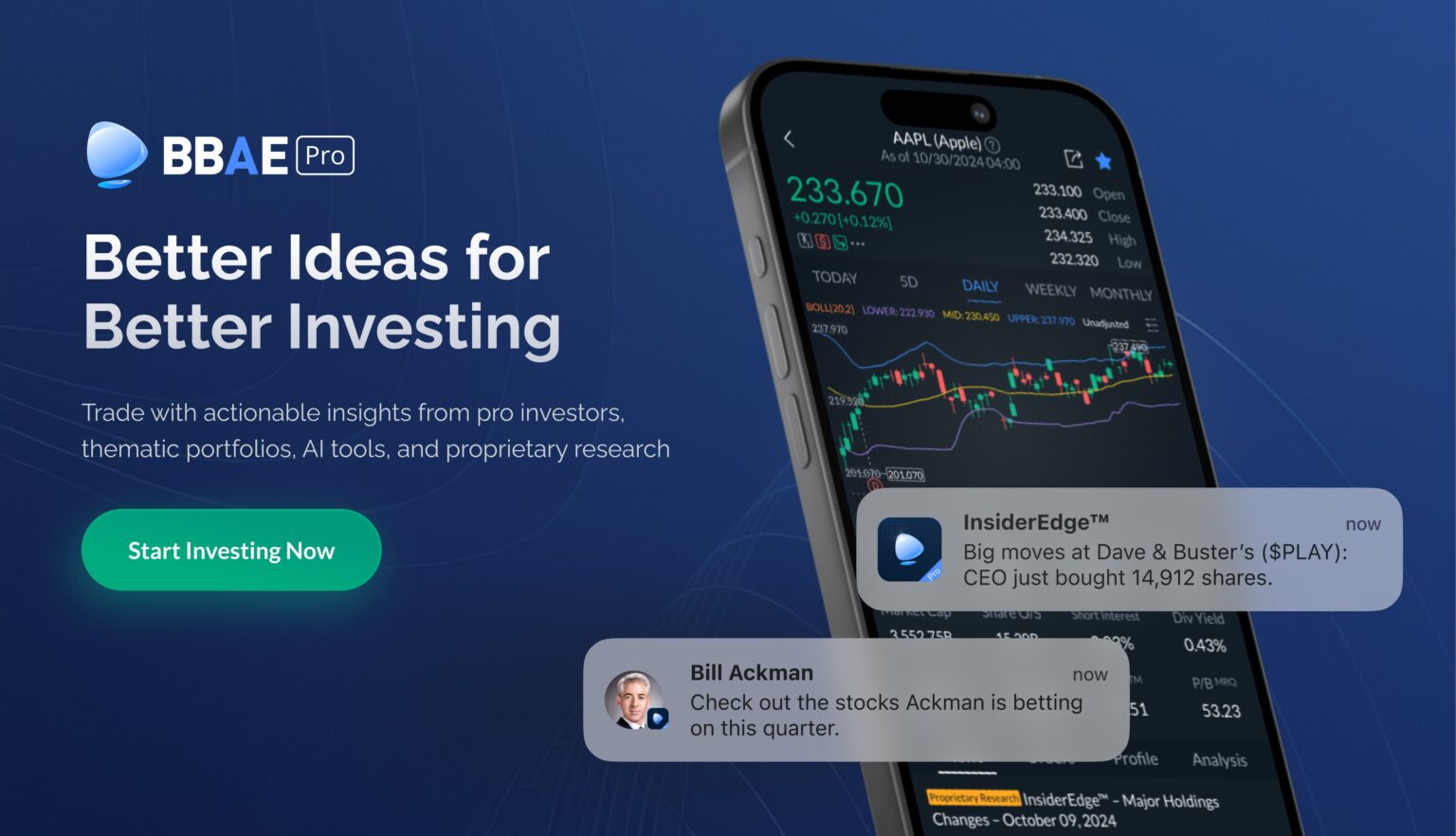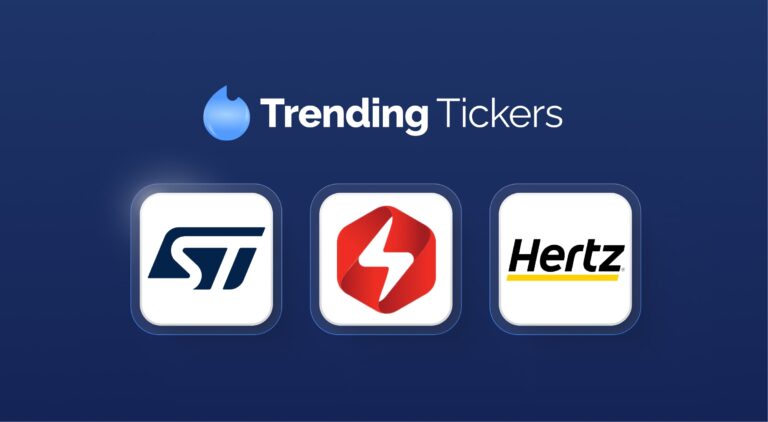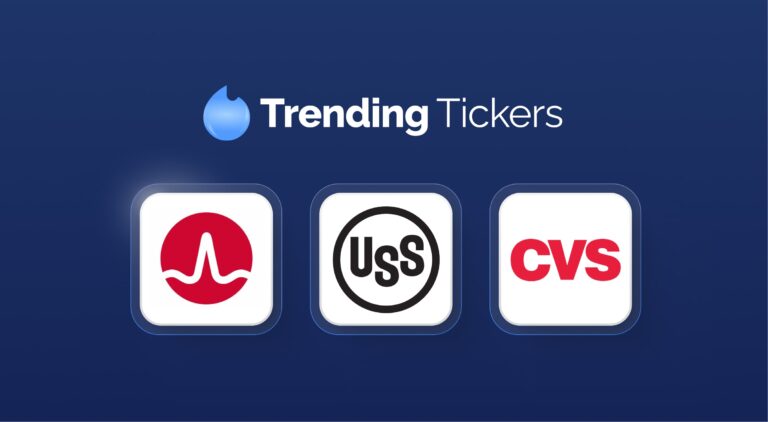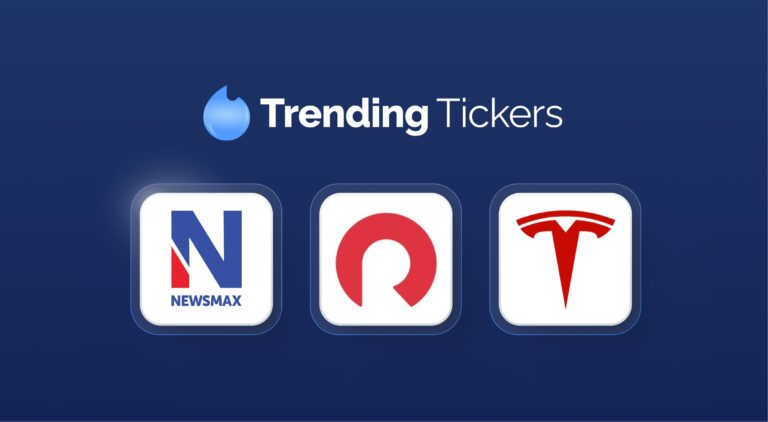Tempus AI ($TEM): A Deep Dive
Introduction
A relatively small AI healthcare company that went public in June of last year, Tempus AI has been attracting investor attention recently following Nancy Pelosi’s purchase of the company’s options last month. Specializing in the application of artificial intelligence and machine learning to healthcare, Tempus leverages vast amounts of clinical and molecular data to assist doctors in making more personalized and precise treatment decisions, particularly in oncology, genomics, and precision medicine. With significant advancements in AI and DNA sequencing over the past decade, the company is well-positioned to improve treatment strategies, enhance medical outcomes, and drive innovations in personalized healthcare.
The company’s founding story is deeply personal for Eric Lefkofsky, the founder and current CEO, who started Tempus in 2015 after his wife was diagnosed with breast cancer. Frustrated by how technology was underutilized in her care, Eric became determined to harness data and AI to improve cancer treatment. In this article, I will review the story of the company, its business model, financial data, and how it is positioned within the current healthcare landscape.
History and Evolution
Tempus AI, Inc. (formerly Tempus Labs, Inc.) was established in 2015 in Chicago by technology entrepreneur Eric Lefkofsky. Lefkofsky’s inspiration for Tempus stemmed from his wife’s 2014 breast cancer diagnosis, which revealed significant shortcomings in data-driven oncology care.
Initially, Tempus concentrated on oncology, developing a data platform that sequenced tumor samples and employed artificial intelligence (AI) models to assist physicians in customizing diagnoses and treatments. Over time, the company broadened its scope beyond cancer, extending its platform to address other diseases. Examples include psychiatric disorders such as depression, anxiety, and ADHD, as well as cardiology, all with the overarching objective of delivering AI-driven precision medicine across “all disease areas globally.”
Tempus began operations in 2015 under the name “Bioin LLC,” subsequently transitioning to Tempus Health and then Tempus Labs. In 2023, the company rebranded as Tempus AI to underscore its focus on AI-centric solutions. By 2024, Tempus had expanded to approximately 2,400 employees and amassed one of the world’s most extensive libraries of clinical and molecular data, reinforcing its influence in AI-powered healthcare.
Team
Two key figures in the company, CEO Eric Lefkofsky and COO Ryan Fukushima, have been with the company since its inception—essentially, the founders are still leading it.
Before founding Tempus, Eric co-founded Groupon, Inc. in 2008, where he held various roles, including board member, Executive Chairman, and CEO. Groupon rapidly grew into a global e-commerce marketplace and went public in 2011, raising $700 million in what was the largest IPO by a U.S. internet company since Google’s $1.7 billion IPO in 2004. Following its IPO, Groupon’s valuation peaked at $13 billion. However, post-IPO performance did not match its pre-IPO success, and the company later lost most of its valuation.
Eric Lefkofsky played a crucial role in Groupon’s founding and early success, providing initial funding and strategic guidance to drive its rapid expansion. While Groupon was his most prominent venture, he was also involved in other projects. In addition to co-founding Groupon, he co-founded InnerWorkings, a marketing firm, and Pathos AI, a clinical-stage biotechnology company focused on using artificial intelligence to re-engineer drug development. Pathos recently closed a Series C private funding round at a $600 million valuation.
Ryan Fukushima has been serving as COO since September 2015. He is also currently the CEO of Pathos AI, a company he co-founded with Eric Lefkofsky.
Funding History and Investors
Since its inception, Tempus has secured significant capital, establishing itself as one of Chicago’s most valuable startups prior to its initial public offering (IPO). Between 2015 and 2023, the company accumulated over $1 billion in private funding across multiple rounds.
Early investment rounds saw notable participation from leading venture capital firms. In 2017, New Enterprise Associates (NEA) and Revolution Growth (Steve Case’s fund) co-led a Series C round, bringing the company’s total funding to $130 million. Subsequent rounds attracted a roster of blue-chip investors. For instance, in 2020, Tempus raised $100 million at a $5 billion valuation with participation from firms such as Baillie Gifford, Franklin Templeton, Novo Holdings, NEA, and T. Rowe Price.
In late 2022, Tempus secured an additional $275 million through a combination of equity and debt financing from Ares Management. Notably, Google’s venture arm contributed $200 million in 2020 as part of a round that valued Tempus at $8.1 billion. This investment was intended to support Tempus’s expansion into infectious disease, depression, and cardiology. Just prior to its IPO in April 2024, SoftBank invested approximately $200 million in a Series G round.
By the time of its public offering, Tempus’s pre-IPO investor base included prominent venture capital firms and institutions such as NEA, Revolution, Baillie Gifford, Franklin Templeton, T. Rowe Price, Novo, Google, and SoftBank.
IPO and Stock Performance
Tempus AI went public on June 14, 2024, listing on the Nasdaq under the ticker $TEM. The IPO was priced at $37.00 per share, at the top of the expected range, with Tempus selling 11.1 million Class A shares, raising approximately $410.7 million in gross proceeds. This pricing implied an initial market capitalization of about $6 billion for Tempus.
The stock opened with strong demand, closing its first trading day at $40.25, up ~9% from the IPO price. In the following months, TEM shares experienced volatility due to broader market fluctuations and shifting sentiment toward tech stocks. While the stock traded above its IPO price at times in late 2024, it eventually declined, closing the year at around $33.76, below its initial offering price.
However, 2025 saw renewed enthusiasm, driven by strong earnings, momentum in the AI sector, and heightened retail investor interest following reports that Nancy Pelosi had purchased call options on TEM. As a result, Tempus stock surged over 100% in the early months of 2025.
Business model
The company’s business model creates a sustainable ecosystem by focusing on three main product lines: Genomics, Data, and Apps. Tempus leverages its CAP-accredited, CLIA-certified laboratories to perform high-throughput genomic sequencing, primarily in oncology, offering physicians detailed reports and AI-informed insights for personalized treatment decisions. This “Genomics” segment generates revenue on a per-test basis. Simultaneously, Tempus capitalizes on the vast data collected from these tests, electronic health records, and imaging, providing data-driven services to third parties. This “Data & Services” segment includes licensing de-identified clinical and molecular data, along with analytical tools, to pharmaceutical and biotech companies for research, drug development, and clinical trials. Tempus also collaborates with academic centers and health systems, granting access to its data libraries and AI models. This segment includes significant strategic partnerships, such as multi-year data licensing deals with AstraZeneca and GlaxoSmithKline.
Genomics: The core of Tempus’s revenue originates from its genomics and diagnostic testing services. In oncology, Tempus sequences tumor DNA and RNA from patient biopsies to identify mutations, utilizing AI algorithms to recommend optimal therapies or clinical trials. Its extensive database of cancer genomic profiles continually enhances its predictive models, aiming to personalize treatment based on prior patient experiences. Tempus has expanded its test menu beyond oncology, offering pharmacogenomic tests in mental health (e.g., Tempus nP for antidepressant and ADHD medication response) and exploring AI-enhanced diagnostics for heart disease in cardiology. These expansions demonstrate Tempus’s ability to apply its core sequencing and AI platform to new therapeutic areas, with each test contributing to the growth and refinement of its data repository.
Data-Driven Solutions: Tempus AI’s second major revenue stream capitalizes on its vast health data repository and analytical capabilities, facilitating drug discovery and development for life sciences companies. The data business is structured around two primary offerings: licensing and trials.
The licensing segment provides pharmaceutical and biotechnology companies with customized libraries of de-identified clinical, molecular, and imaging (IM) data, integrated with a suite of analytic and cloud computing tools available through the LENS platform. These datasets empower drug developers with insights that enhance decision-making across the entire drug lifecycle, from discovery to commercialization. Customers can access Tempus’s de-identified database on a per-file basis or through multi-year subscription agreements.
According to the company, it has collaborated with over 200 biotech firms. Two significant multi-year strategic collaborations highlight the value of Tempus’s database. In 2021, AstraZeneca signed an enterprise agreement for non-exclusive de-identified data licensing and other Tempus services, followed by a similar agreement with GlaxoSmithKline in 2022. These partnerships demonstrate the growing reliance of global pharmaceutical leaders on Tempus’s data solutions.
Unlike traditional diagnostic labs that primarily depend on reimbursement revenue, Tempus not only receives test reimbursements but also licenses its de-identified data multiple times to multiple customers, creating a compounding revenue effect. By converting diagnostics into valuable multimodal datasets, Tempus has developed a differentiated model that monetizes laboratory results in ways traditional labs cannot.
The trials business leverages Tempus’s extensive network of oncologists to improve clinical trial enrollment, particularly for hard-to-find and underserved patient populations. Time, Tempus’s clinical trial matching platform, is built on near real-time data feeds and AI-driven insights to accelerate the connection between patients, trial sites, and sponsors. This technology enables oncologists to guide their patients toward relevant trials while helping pharmaceutical companies efficiently enroll participants. In addition to trial matching, Tempus offers clinical trial services and sponsors its own studies.
In January 2022, Tempus expanded its trials segment by acquiring Highline Consulting, a contract research organization, subsequently rebranded as Compass. The company also collaborates with life sciences firms to conduct data-driven studies on drugs, devices, and diagnostics, integrating Tempus’s life science solutions to accelerate drug development. Tempus believes its trials business has the potential to significantly expand patient access to clinical research across the United States, further reinforcing its role in precision medicine and data-driven healthcare innovation.
Applications: A key differentiator for Tempus is its extensive use of artificial intelligence, including generative AI. Its platform, an “operating system” for precision medicine, utilizes AI to analyze diverse health data. Tempus develops “Intelligent Diagnostics” that enhance lab test accuracy and personalization through AI-driven insights from prior patient data. The company is developing proprietary AI products, such as:
- Hub: Hub integrates seamlessly into physicians’ workflows, allowing them to order lab tests, track results, and develop treatment plans using the platform’s data. It also helps doctors assess how patients are responding to therapies. Hub automates many previously resource-intensive tasks, making genomic reports accessible and efficient. Features like the Time on Therapy Tool help physicians track patient progress, compare patients with similar molecular profiles, and identify treatment alternatives based on real-world data.
- One: an AI-enabled assistant for providers and researchers that enables rapid insights. One facilitates quick retrieval of patient information (report status, biomarker results), identification of relevant clinical trials based on patient criteria, definition of research cohorts using natural language (without coding), and acceleration of time to insights with generative AI by exploring unstructured clinical data and easily creating cohort and prevalence summations.
- Lens: allows life sciences researchers to interact with their de-identified data set. Researchers can create patient cohorts and perform analyses without writing code, streamlining the research process.
- Link: Clinical trial matching and enrollment software, offering fast access to patient reports, advanced patient search, and real-time order tracking for oncology providers.
- Olivia: The most recent application, an AI-enabled personal health concierge designed for patients, that consolidates healthcare data onto a single platform and uses AI to provide actionable insights.
Tempus AI’s three main product lines—Genomics, Data, and Apps—are designed to complement each other, creating network effects that enhance the overall value of its ecosystem. As more data is collected, the AI models become more refined, leading to smarter tests and applications, which, in turn, drive further growth in both the clinical network and the database.
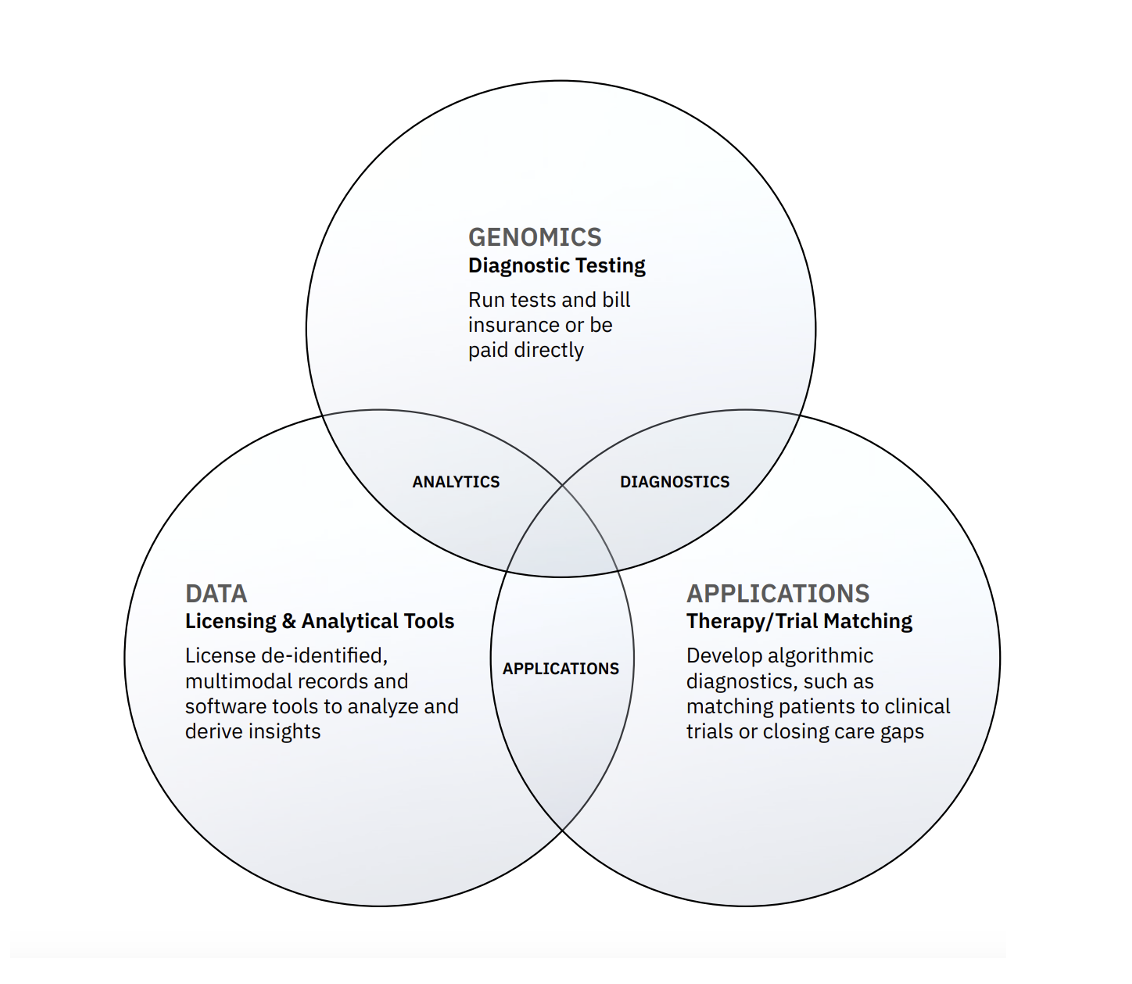
Key Metrics
Tempus AI’s impact and reach are reflected in several key metrics:
- Approximately 65% of all Academic Medical Centers in the US are connected to Tempus.
- Over 50% of oncologists in the US are connected to Tempus through sequencing, clinical trial matching, and research-enabled partnerships.
- 95% of the top 20 pharmaceutical oncology companies partner with Tempus.
- The company has established over 200 biopharma partnerships.
- Tempus has compiled approximately 8 million de-identified research records to power scientific discovery and improve patient outcomes.
- More than 30,000 patients have been identified for potential enrollment into clinical trials within Tempus’s network.
- The company manages over 250 petabytes of data, underscoring the vastness of its data repository.
- Collectively, these metrics highlight Tempus AI’s significant role in integrating genomics, data analytics, and AI to advance precision medicine and improve patient care.
Competitive Advantage
Tempus’s primary competitive advantage lies in the scale and breadth of its data ecosystem, which creates high barriers to entry. The company has built one of the world’s largest libraries of multimodal medical data—including genomic sequences, pathology slides, radiology images, and electronic health records—all linked to patient outcomes. According to the company’s S-1 filing, this dataset continues to expand, with clinical sequencing volume increasing from approximately 31,000 samples in 2018 to 288,000 in 2023, demonstrating widespread adoption of its tests.
Critically, Tempus has expanded its provider network, with 50% of U.S. oncologists ordering its tests or contributing data, up from 30% five years ago. This network fuels a self-reinforcing cycle: more physicians using Tempus generate more patient data, which enhances its AI models, making its services more valuable and attracting even more physicians. Replicating this network effect would be highly challenging for competitors.
Tempus’s influence extends beyond healthcare providers to biopharma, with ~95% of the top 20 pharmaceutical companies using its data or trial services. By integrating into clinical workflows (via hospital EMR integrations and decision-support tools) and pharma R&D pipelines, Tempus has solidified its position at the center of precision medicine. This reach—spanning over 7,000 physicians and hundreds of research partners—forms a significant moat that single-focus competitors would struggle to overcome.
Tempus also differentiates itself through its dual business model, which combines a diagnostics lab with a data-licensing business—an integration that few rivals offer. Tempus pioneered this approach, whereas competitors typically specialize in one domain. For instance, Foundation Medicine (Roche) focuses on genomic testing, while Flatiron Health (also Roche) specializes in oncology EHR data. By operating both under one platform, Tempus can layer patient information from its vast dataset on top of test results, yielding richer insights.
Acquisitions
Tempus AI has been expanding its capabilities through key acquisitions that strengthen its position across oncology, cardiology, genetics, and clinical research. These strategic moves reflect Tempus’ commitment to integrating AI-driven solutions into patient diagnostics, treatment, and clinical trials.
In February 2022, the company acquired Highline Sciences, a specialized clinical contract research organization (CRO) focused on oncology, enhancing Tempus’ ability to support and execute clinical trials. A year later, in September 2023, Tempus strengthened its presence in cardiology by acquiring Mpirik, a healthcare technology company that uses AI to detect and address cardiovascular disease earlier. In November 2024, Tempus announced a $600 million acquisition of Ambry Genetics, a genetic testing company, a move aimed at improving genetic-based precision medicine. The deal was finalized in February 2025, reinforcing Tempus’ focus on personalized healthcare. Most recently, in March 2025, Tempus acquired Deep 6 AI, an AI-driven clinical trial recruitment platform with a vast network of 750+ provider sites and over 30 million patients, significantly expanding its capabilities in clinical research.
These acquisitions highlight Tempus AI’s focus on developing AI-powered solutions across oncology, cardiology, genetics, and clinical trials, further strengthening its role in precision medicine.
Ownership
Following its IPO, Tempus AI’s ownership structure includes its founder, early venture investors, and a range of institutional shareholders. Insiders—comprising executives and board members—collectively control over 52.9% of the company’s shares as of 2025, underscoring the substantial stakes retained by founder Eric Lefkofsky and other key early figures.
Lefkofsky, who serves as CEO, is the largest individual shareholder with roughly 46 million shares, representing around 27% of the company. His longtime business partner and Groupon co-founder, Brad Keywell, also maintains a notable stake, holding over 11.5 million shares, or about 7%.
Among institutional investors, ARK Investment Management, led by Cathie Wood, has taken an active position in Tempus. Through its innovation and genomics-focused ETFs, ARK holds more than 5.7 million shares (~3.5%), making $TEM the eighth-largest position in its flagship $ARKK ETF and the fourth-largest in its genomics ETF. ARK has consistently increased its stake, with the most recent addition on March 19, 2025, totaling 142,530 shares.
Early backer Revolution Growth, associated with AOL co-founder Steve Case, owns approximately 2.2% of Tempus. Other major institutional holders include Baillie Gifford, Franklin Templeton, and funds managed by T. Rowe Price and Nikko Asset Management.
Insider Selling Activity After Lock-Up Expiration
Following the expiration of Tempus AI’s IPO lock-up period in late 2024, several insiders began selling shares—a common occurrence as early investors seek liquidity. Among them, CEO Eric Lefkofsky has gradually reduced his position through a series of notable transactions.
Between December 2024 and February 2025, Lefkofsky sold approximately 4.6 million shares, representing about 11% of his holdings, for total proceeds exceeding $250 million. The most significant activity occurred in late February, when he sold 3,240,230 shares at $58.75 per share—generating $190.36 million—across multiple transactions, according to filings reported by InsiderEdge.
Co-founder Brad Keywell and COO Ryan Fukushima also capitalized on the post-lock-up window. Keywell sold roughly $83 million worth of Tempus stock between December 2024 and March 2025. Fukushima sold shares totaling approximately $9.5 million during the same period.
Financial Statements Review
Revenue Growth
Tempus AI has demonstrated strong top-line momentum, scaling rapidly as it expanded its customer base and service offerings. Just two years after its founding, revenue was in the tens of millions. By 2020, it had reached $188 million. Growth continued in the following years: revenue rose to $258 million in 2021, $321 million in 2022, and surged to $532 million in 2023—a 65.8% year-over-year increase. This acceleration was likely driven by higher testing volumes post-pandemic and the expansion of data partnerships.
The growth continued through the IPO. Full-year 2024 revenue came in at $693.4 million, up roughly 30% from 2023.
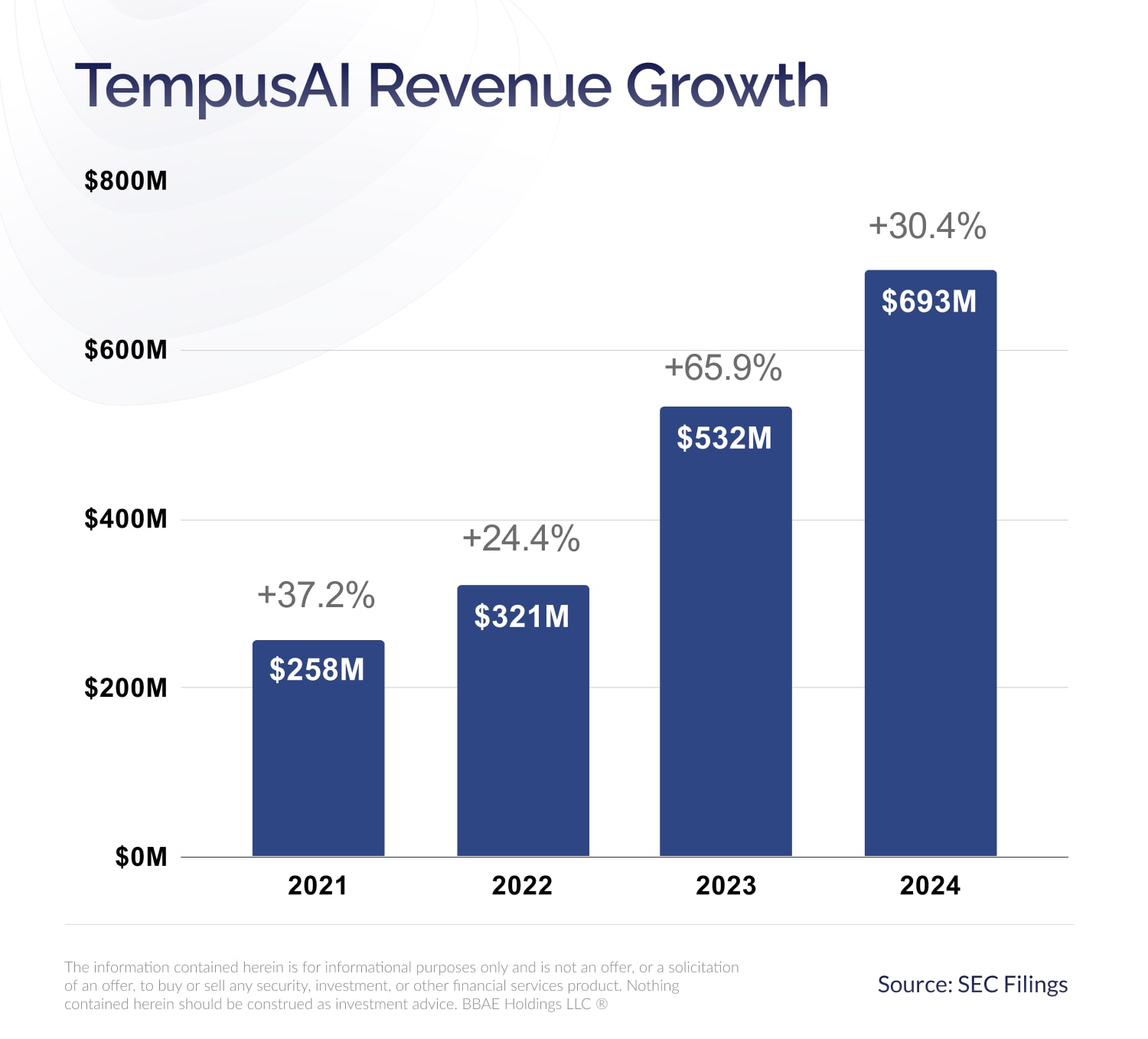
Profitability and Margins
Like many fast-growing tech-health companies, Tempus remains unprofitable as it prioritizes expansion. Losses have been substantial, though 2024 figures were affected by one-time accounting charges related to the IPO.
In 2024, Tempus reported $381 million in gross profit on $693 million in revenue (~55% gross margin), up from ~41% in 2020 and ~54% in 2023. This improvement reflects both scale and the increasing contribution from higher-margin data services.
Tempus’s leadership has signaled a pivot toward profitability. CEO Eric Lefkofsky has stated the company is on track to achieve adjusted EBITDA profitability in 2025.
Conclusion
Tempus AI operates at the intersection of genomics, data, and artificial intelligence, with a business model that spans both testing services and data-driven offerings. Its financial profile reflects rapid revenue growth, expanding gross margins, and ongoing investment in infrastructure and product development. The company has outlined a path toward adjusted EBITDA profitability in 2025, supported by scale in its core genomics business and growth in its higher-margin data segment.
As the company continues to expand its testing portfolio and data capabilities across disease areas, future performance will depend on adoption by physicians and payers, regulatory developments, and the competitive landscape.
This article is for informational purposes only and is not investment advice or a solicitation to buy or sell securities. The content is based on publicly available information and reflects the author’s opinions as of the publication date, which may change without notice. All investments carry inherent risks, including the potential loss of principal, and past performance is not indicative of future results. Readers should conduct their own research or consult a financial advisor before making investment decisions. BBAE holds no position in the securities mentioned, nor are they compensated by the companies mentioned.



